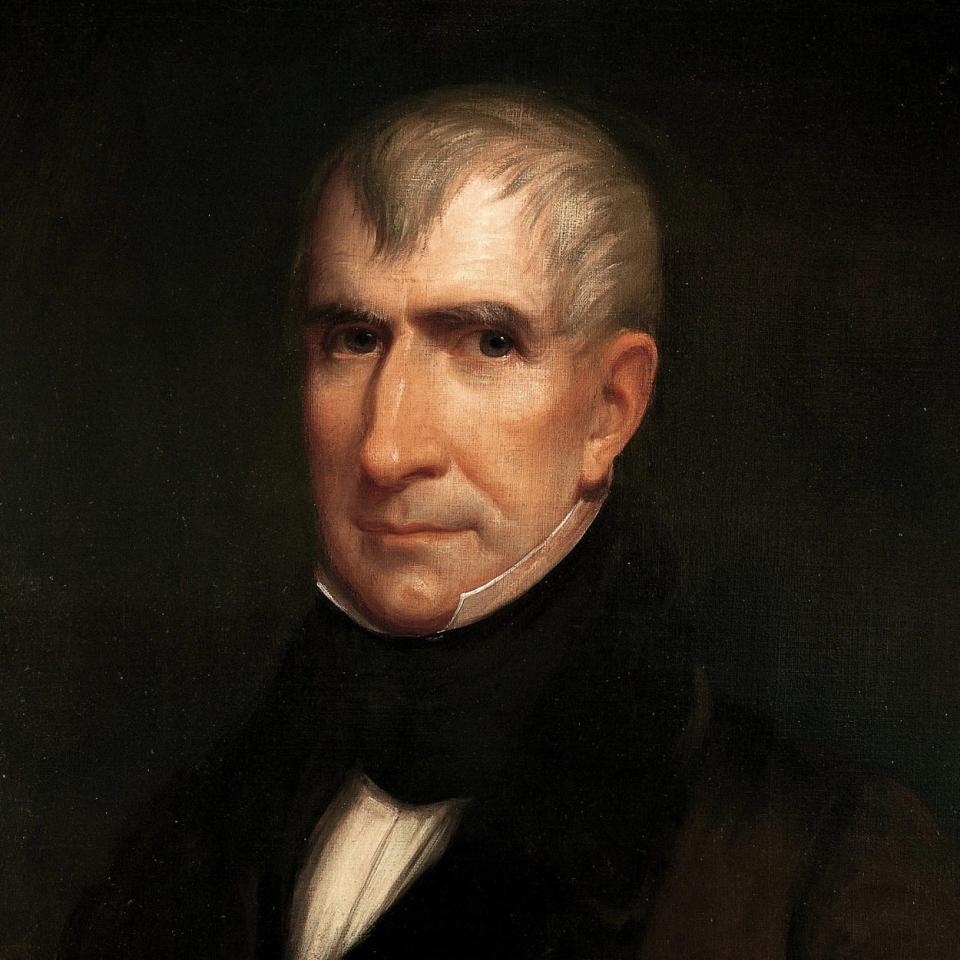The infamous 'log cabin and hard cider' campaign of WIlliam Henry Harrison
- Oops!Something went wrong.Please try again later.
- Oops!Something went wrong.Please try again later.
- Oops!Something went wrong.Please try again later.
- Oops!Something went wrong.Please try again later.
“The delegation of this gallant little State [Delaware] reached the city at an early hour yesterday morning,” the Washington, D. C. newspaper, Madisonian, reported on May 7, 1840 as state delegations arrived in Baltimore for the Young Men's Whig Convention.
The newspaper went on to comment that the Delaware delegation included representatives for the state’s three counties, and when they arrived, they marched behind a banner that read, “The first to adopt — The last to abandon the Constitution.
In 1840, the Whig party nominated William Henry Harrison, a member of a prominent Virginia family and the hero of the battle of Tippecanoe over the Native Americans. Harrison’s opponent, incumbent Democratic President Martin Van Buren, was a former vice-president under Andrew Jackson and a veteran of Washington politics.
Beaches entertainment slate: Taylor Swift parties coming to Dewey, Ocean City's Seacrets to go Irie-Ish for big fest
Maryland delegates get the 'ball in motion' for Harrison

At the Whig meeting in Baltimore, delegates from western Maryland arrived rolling a mammoth ball.
According to the Madisonian, “A curious affair followed here, which was immediately preceded by a flag announcing that, ‘Alleghany is coming.’ It was a huge ball about ten feet in diameter, which was rolled along by a number of the members of this delegation; the ball was apparently a wooden frame, covered with linen painted in diverse colors and bearing a multitude of inscription and quotations, original stanzas, and pithy sentences, which it was impossible to collect in consequence of the motion of the ball. We think there was other evidence, yesterday, that ‘the Ball is in motion.’ ”
Harrison and his running mate, John Tyler, ran under the snappy slogan, “Tippecanoe and Tyler too!” The Harrison campaign was given a further boost by a gaffe by one of Van Buren’s supporters.
Beloved dog breeds: Maryland loves dogs, but which breed is most popular? Meet the top pooch here and in US
The insult that made Harrison 'a friend of the common man'
In 1922, over 80 years after the campaign, the Wilmington Sunday Star reported that a Van Buren surrogate, “stated that he, Harrison, was a weak and womanly old grandfather, unfit for the Presidency, and recommended that he be left in his log cabin at North Bend, Ohio, to regain himself with a barrel of hard cider, and corned hominy and raccoon meat.”
The insult boomeranged on the Democrats when the well-to-do Harrison, who lived on a substantial farm in Ohio, campaigned as a friend to the common man and distributed whisky containers shaped like miniature log cabins to drive home the point.
According to the Wilmington Sunday Star, “No election held in Delaware has ever aroused such intense enthusiasm as the famous Tippecanoe or Hard Cider and Log Cabin campaign of 1840. So intense was the rivalry on both sides that women for the first time took part in political processions and could be seen perched on log cabins that were drawn through all parts of the State.”
In the early 19th century, John Middleton Clayton of Sussex County was the dominant politician in Delaware. Elected to the United States Senate in 1828, Clayton would eventually serve as Secretary of State under President Zachary Taylor.
The leader of the Whig party in Delaware, Clayton was credited with leading Harrison to victory in the First State.

At the end of the Young Men's Whig Convention, the large campaign ball was awarded to Delaware for having the most delegates at the meeting. The ball was rolled from Baltimore to Wilmington and eventually to Clayton’s Sussex County.
The origin of the phrase, “Keep the ball rolling,” has been attributed to that large ball that was last seen in Baltimore Hundred, a bastion of Whig support.
Principal sources
Madisonian, May 7, 1840.
Wilmington Sunday Star, Dec. 3, 1922.
Joseph P. Comegys, “Memoir of John M. Clayton,” Papers of the Historical Society of Delaware, IV, Wilmington: The Historical Society of Delaware, 1882, pp. 12, 33, 137.
This article originally appeared on Salisbury Daily Times: How Maryland, Delaware got ball rolling to get Whigs into White House

